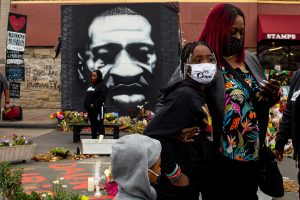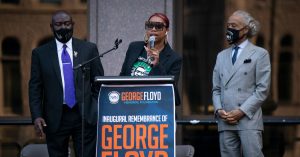
MINNEAPOLIS — One year ago today, the Minneapolis Police Department issued a short, incomplete statement headlined “Man Dies After Medical Incident During Police Interaction.”
The world would soon learn the details after a bystander’s cellphone video went viral. It showed George Floyd, a Black man, struggling to breathe on a street corner while under the knee of a white police officer for more than nine minutes. Last month, a jury decided that it was murder.
Over the past year, America changed — but it is too soon to say how much. Millions of people, in the middle of a pandemic, flooded the streets of big cities and small towns, demanding that the country face up to its long history of racism and police brutality.
State legislatures and city councils approved police reforms, and in some cases took money away from police departments after calls to “defund the police.” National legislation, however, remains stalled; the George Floyd Justice in Policing Act has passed the House, mostly along party lines, but not the Senate.
To mark the first anniversary of Mr. Floyd’s death, President Biden will host the Floyd family at the White House. Before they traveled to Washington, many family members returned to Minneapolis over the weekend.
“It has been a long year. It has been a painful year.” Bridgett Floyd told a crowd on Sunday evening outside the courthouse where Derek Chauvin was recently convicted of murdering her brother.
The anniversary is shaping up not just as a remembrance of Mr. Floyd’s life and legacy, but also as a time to give voice to the many families who have lost loved ones to police violence. As Americans gather throughout the country — in Washington, D.C., in Chicago, in Seattle — their eyes will be turned to Minneapolis.
Beginning at 11 a.m., the Commons, a downtown park, will host an event that will honor Mr. Floyd “through Black culture, art, history and support of local businesses,” according to the George Floyd Memorial Foundation. Throughout the day, people will come together at George Floyd Square, the several blocks around Cup Foods, near where Mr. Floyd was killed. At 8 p.m. there will be a vigil at Mitchell Hamline School of Law in St. Paul.
The Floyd family was joined in recent days by the relatives of other Black men and boys whose deaths caused outrage — the mother of Eric Garner, the mother of Trayvon Martin, the mother of Oscar Grant, a cousin of Emmett Till. Their presence has helped place Mr. Floyd’s death into the broader context of America’s struggle for equality.
As Deborah Watts, the cousin of Mr. Till, who was lynched in Mississippi in 1955, told the crowd here on Sunday: “The past is not past until justice is served.”

President Biden will meet on Tuesday with relatives of George Floyd to mark the anniversary of his death and the start of a nationwide racial reckoning against police brutality.
The meeting at the White House will be private, White House press secretary Jen Psaki said during a news conference on Monday. Several members of the family, with whom Ms. Psaki said Mr. Biden have developed relationships, will attend, including several siblings, and his daughter, Gianna.
A video of the killing of Mr. Floyd in Minneapolis — which showed an officer kneeling on his neck for nine minutes and 29 seconds — sparked the largest racial justice protests in generations and brought a sense of urgency to negotiations over police reform in Congress . The officer at the center of Mr. Floyd’s killing, Derek Chauvin, was convicted last month of second-degree murder, third-degree murder, and second-degree manslaughter.
But police reform legislation, known as the George Floyd Justice in Policing Act, has languished in Congress, as parties spar over a measure that would alter a legal shield known as qualified immunity that protects police officers in brutality cases. The White House had set its own deadline for Congress to pass the legislation, which Ms. Psaki acknowledged on Monday will not be met.
During his joint address before Congress, Mr. Biden, invoking a conversation he had with Mr. Floyd’s young daughter, called on lawmakers to pass legislation by the first anniversary of Mr. Floyd’s death.
When asked during the news conference on Monday about progress on police reform, Ms. Psaki indicated that the White House remained relatively optimistic. Mr. Biden spoke on Friday with Senator Cory Booker, Democrat of New Jersey and an outspoken proponent of police reform, she said, adding that Senator Tim Scott of South Carolina, the Republicans’ lead negotiator on the issue, also expressed interest in continued talks.
“The president is still very much hopeful that he will be able to sign the George Floyd Justice in Policing Act into law,” she said.







